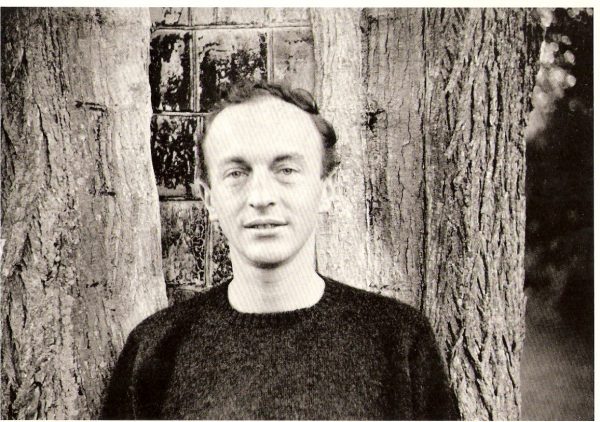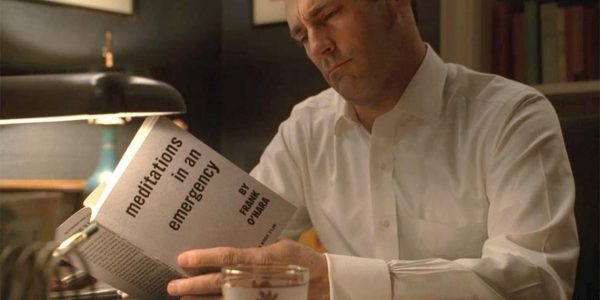If you’re a Mad Men fan, you may have come across a Frank O’Hara reference in the opening episode of season 2. The main character, Don Draper, is the falling man of our time, the man who is defined by products, the man whose identity is uncertain, the man who is anxious about his standing in the world.
Sitting at a bar, Draper notices a guy reading the O’Hara poetry collection Meditations in an Emergency (which includes the poem by the same name). Draper asks, “Is it good?” The poetry reader says, “I don’t think you’d like it.” Draper is chagrined. Later, we see him reading Meditations in an Emergency at home.
O’Hara’s “Meditations in an Emergency” poem is well-suited for the current milieu. Yet, after the Trump election, celebrated poet and critic Stephen Burt opined the irrelevance of poets “who might be called writers of liberalism, to whom I feel especially close.” These poets include Frank O’Hara. Instead of O’Hara, Burt espouses W.B. Yeats as a writer whose poetry captures the conflicted and dark political climate we live in, because Yeats’ poetry “captured so well the feeling of noble failure—of having lost an unfair fight.”
Yeats was an Irishman who wrote a poem that might as well have been addressed to Hillary Clinton after her loss in the election. It’s called, “To a Friend Whose Work Has Come to Nothing”. Here’s a particularly apt excerpt:
“Now all the truth is out,
Be secret and take defeat
From any brazen throat,
For how can you compete,
Being honor bred, with one
Who were it proved he lies
Were neither shamed in his own
Nor in his neighbours’ eyes…”
Burt is right: it’s stunning just how appropriate this is for a time of Trump, a time in which Clinton is still coping with defeat by a brazen man who lied his way into office. Yet, is this what you or I need right now—a poetry of defeat, a poetry that helps us wallow in the helplessness of the past? This is the type of poetry that lends itself easily to anxiety about the future and depression about the past.
Our national moment is defined by anxiety, the feeling to which we’re most prone as the world appears to reel out of control. There’s no way to be absolute about how many people are experiencing anxiety, but the Anxiety Centre places the number at up to 30 percent of the US population. When it comes to anxiety, a common question is, “Why am I anxious and how can I cope with it?”.
There are plenty of natural ways to reduce anxiety, and one of them is meditation. Meditating 30 minutes daily can help alleviate anxiety symptoms and minimize depression. This is where Frank O’Hara’s “Meditations in an Emergency” comes in.

Like Trump and Clinton, O’Hara was a New Yorker who was very much in the public eye. A famous poet of his time—and still one of the most famous American poets—O’Hara was a homosexual who dealt with discrimination and wrote about his everyday experiences. Like many Americans today, he experienced a placeless kind of anxiety. Here’s a particularly apt excerpt from “Meditations in an Emergency”:
My eyes are vague blue, like the sky, and change all the time; they are indiscriminate but fleeting, entirely specific and disloyal, so that no one trusts me. I am always looking away. Or again at something after it has given me up. It makes me restless and that makes me unhappy, but I cannot keep them still. If only I had grey, green, black, brown, yellow eyes; I would stay at home and do something. It’s not that I am curious. On the contrary, I am bored but it’s my duty to be attentive, I am needed by things as the sky must be above the earth. And lately, so great has their anxiety become, I can spare myself little sleep.
His anxiety is palpable, and like many of us, it’s his duty to be attentive to what he’s doing, which is incredibly tough when you’re anxious. He can’t help but “look away”; he can’t help but divert his eyes, which makes him seem disloyal, so that no one trusts him. He is “needed by things”, a feeling many of us can’t help but escape as we search for minimalism in a time of excess. He has trouble sleeping, a problem many of share as we click from page to page, “always looking away” from our present moment, which makes us restless—we can’t keep still.
O’Hara’s poem is his meditation, his way of coping with the anxiety he feels in a time of emergency. And perhaps that’s what the anxious ones among us need: meditation, poetry, a release from the demand of things and the heaviness of the news. Mad Men’s Don Draper would agree.
Spoiler alert: As the Mad Men series progresses, Draper loses it, he falls apart, increasingly succumbing to anxiety, hallucinations, and a lack of focus. What brings him back to a place where he can be creative and live with himself? Meditation. In the final episode, he meditates on the beach. It’s then that he has a revelation that brings back his creative self.
Like Draper, and like O’Hara, I choose to meditate in this time of emergency, this time of Trump. What do you choose?
[alert type=alert-white ]Please consider making a tax-deductible donation now so we can keep publishing strong creative voices.[/alert]
Save

